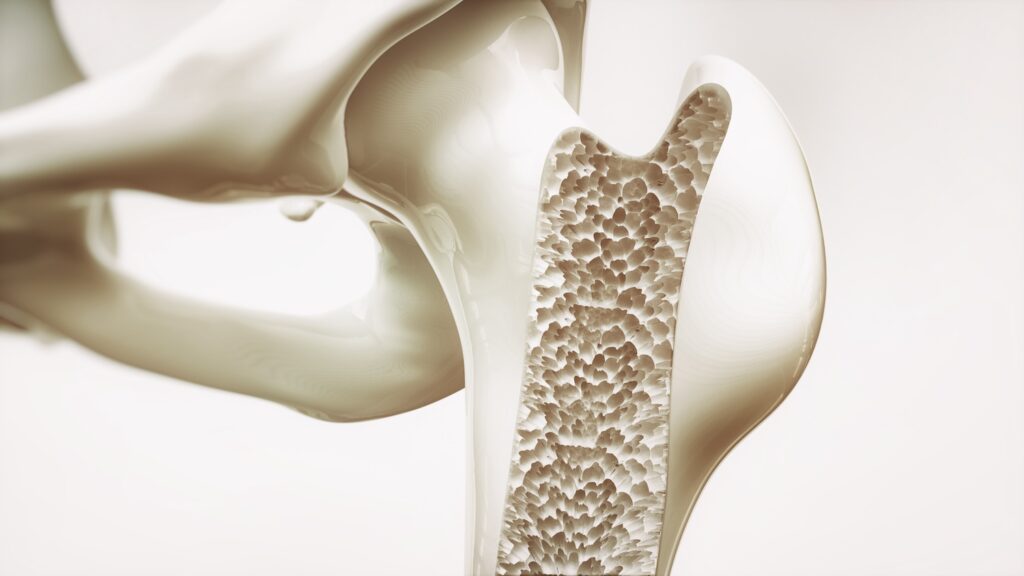Men And Osteoporosis
Osteoporosis is a significant but sometimes underestimated issue in men
Although the bone disorder is more common in women, men actually account for disproportionately more fractures due to the condition than women and face a higher risk of dying as a result. It’s therefore crucial to recognize and address this condition to improve men’s overall health outcomes and quality of life.
Risk Factors For Osteoporosis In Men
Throughout men’s lives, bone density is affected by factors such as genetics, physical activity, diet, hormones (such as testosterone), lifestyle choices and the use of certain medications.
Factors that are linked to an increased risk of osteoporosis in men include:
- a family history of osteoporosis, fractures and loss of height
- chronic diseases – such as rheumatoid arthritis, overactive thyroid or parathyroid glands, celiac disease and other chronic gut conditions, chronic liver or kidney disease, diabetes and low testosterone levels
- regular use of certain types of medication, such as glucocorticoids, anticonvulsant medication, some anti-depressants and treatment for prostate cancer
- lifestyle factors, such as smoking, excessive alcohol use, low calcium intake, inadequate exercise, obesity, vitamin D deficiency and low body weight.
Interestingly, while women experience rapid bone mass loss after menopause, men don’t undergo this sudden change. However, by age 65 or 70, both men and women lose bone mass at a similar rate. Calcium absorption also declines in this age range. Men and their physicians may also not focus on bone thinning as much as women do, leading to potential risks going unnoticed until fractures, back pain, or changes in height or posture occur.
What is a Bone Density Test?
Bone density tests, also known as bone mineral density (BMD) scans, are crucial in diagnosing osteoporosis and assessing fracture risk. A bone density scan measures the amount of calcium and other minerals present in a segment of bone, typically in the spine, hip, or forearm. This test is essential for determining the strength and density of bones and predicting the likelihood of fractures.
Why Men Should Consider a Bone Density Scan
Men have a higher peak bone mass compared to women and lose bone mass more slowly as they age. However, up to one in four men over the age of 50 will experience a fracture due to osteoporosis. Complete the bone health quiz to find out what your risk might be.
Factors that may prompt a bone density test for men include:
- Age: Men over 50 are at increased risk.
- Height Loss: A significant loss in height could indicate spinal fractures.
- Fracture History: Experiencing fragility fractures can be a sign of weakened bones.
- Medication Use: Long-term use of steroids can interfere with bone rebuilding.
- Hormonal Changes: Treatments for conditions like prostate cancer can reduce testosterone levels, weakening bones.
How To Get Bone Density Scan
The most common method for conducting a bone density test for men is dual-energy X-ray absorptiometry (DXA or DEXA). DXA uses low-level X-rays to measure bone mineral density in the hip, spine or other bones to determine the risk of osteoporosis. The procedure is quick, non-invasive, and requires minimal radiation exposure. The scan results can provide helpful details about your risk for osteoporosis (bone loss) and fractures (bone breaks). DXA can also measure your body composition, such as body fat and muscle mass.
Interpreting the Results of DEXA Scan Bone Density Test
The most common method for conducting a bone density test for men is dual-energy X-ray absorptiometry (DXA or DEXA). DXA uses low-level X-rays to measure bone mineral density in the hip, spine or other bones to determine the risk of osteoporosis. The procedure is quick, non-invasive, and requires minimal radiation exposure. The scan results can provide helpful details about your risk for osteoporosis (bone loss) and fractures (bone breaks). DXA can also measure your body composition, such as body fat and muscle mass.
Conclusion
Bone density testing for men is an important step in maintaining bone health and preventing fractures. Men, especially those over 50 or with risk factors, should discuss the possibility of a bone density test with their healthcare provider. Early detection and treatment can significantly impact the quality of life and mobility in later years.
Remember, bone health is not just a women’s issue; it’s a concern for men too. Taking proactive steps, including getting a DXA bone density test when appropriate, can help men stay strong and active as they age. The Bone Density Scan from Dexacan includes a radiologist report and a consultation with our doctor to review the results. The physician can then provide recommendations or referrals based on the findings. Contact Dexacan today at 778.760.2161 or online now for more information or to request an appointment.




